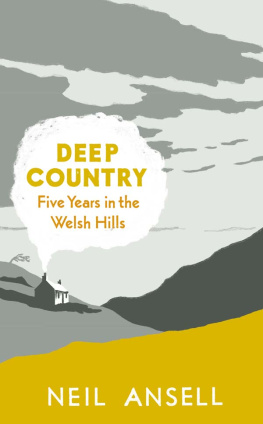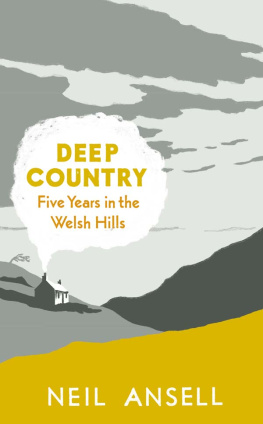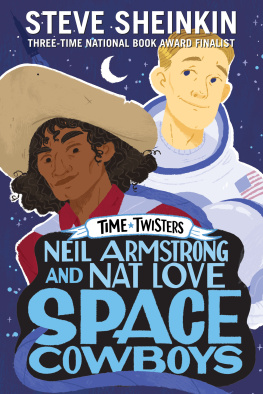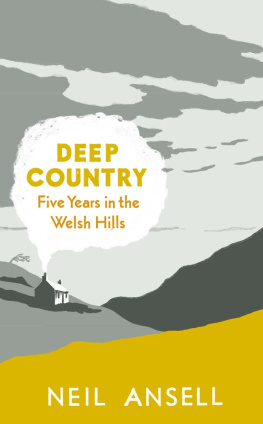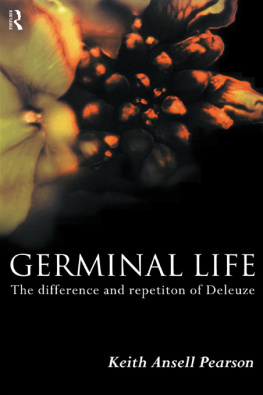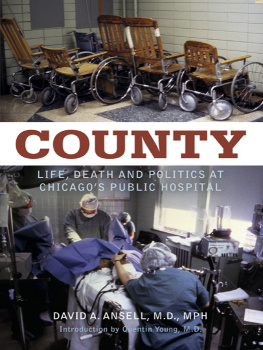Deep Country
Five Years in the Welsh Hills
NEIL ANSELL

HAMISH HAMILTON
an imprint of
PENGUIN BOOKS
HAMISH HAMILTON
Published by the Penguin Group
Penguin Books Ltd, 80 Strand, London WC2R 0RL , England
Penguin Group (USA) Inc., 375 Hudson Street, New York, New York 10014, USA
Penguin Group (Canada), 90 Eglinton Avenue East, Suite 700, Toronto, Ontario, Canada M4P 2Y3 (a division of Pearson Penguin Canada Inc.)
Penguin Ireland, 25 St Stephens Green, Dublin 2, Ireland (a division of Penguin Books Ltd)
Penguin Group (Australia), 250 Camberwell Road, Camberwell, Victoria 3124, Australia (a division of Pearson Australia Group Pty Ltd)
Penguin Books India Pvt Ltd, 11 Community Centre, Panchsheel Park, New Delhi 110 017, India
Penguin Group (NZ), 67 Apollo Drive, Rosedale, Auckland 0632, New Zealand (a division of Pearson New Zealand Ltd)
Penguin Books (South Africa) (Pty) Ltd, 24 Sturdee Avenue, Rosebank, Johannesburg 2196, South Africa
Penguin Books Ltd, Registered Offices: 80 Strand, London WC2R 0RL , England
www.penguin.com
First published 2011
Copyright Neil Ansell, 2011
The moral right of the author has been asserted
All rights reserved
Without limiting the rights under copyright reserved above, no part of this publication may be reproduced, stored in or introduced into a retrieval system, or transmitted, in any form or by any means (electronic, mechanical, photocopying, recording or otherwise), without the prior written permission of both the copyright owner and the above publisher of this book
Endpaper illustration by Andrew Farmer
A CIP catalogue record for this book is available from the British Library
ISBN: 978-0-141-96133-0
Prologue
The drivers always seem bemused when I tell them where to drop me. On a long, fast sweep of the road flanked with serried ranks of pine, there is a track through the woods, but it is invisible to anyone who doesnt know exactly where to look. It is the merest whisper of a trail; I doubt that anyone other than me has trodden it for many a year. I step into the cool hush of the pine forest and make my way down to the valley floor. Through the trunks I can see the glimmer of light on water far below. Way above me a sparrowhawk is circling in her display flight.
There is a footbridge over the river, an old suspension bridge, and I pause midway to lean on the rail and look downriver at the water boiling over submerged rocks and veering around little mossy islands. The hours I have spent watching this river roll by, sometimes at a crawl, sometimes in a raging brown torrent. And then I look up; the day is wearing on and I still have a mountainside to climb. The steepest of steep fields, if you stretch your arms out in front of you as you are walking up it you can almost touch the ground ahead of you. It is May and the field is a haze of blue, the air thick with scent. Bluebells are flowers of the forest, not the field, but long, long ago this field was wooded; the biggest stumps, those too big to be dragged out by tractor, still stud the ground. And the bluebells still emerge in their thousands every spring in remembrance; the ground layer of the ghost of a wood.
Over a crumbling gate is the moor. The tight coils of bracken are unfurling, the whole hillside is bursting into life. Before long the bracken will be head-high and the trail will be a green tunnel. A pair of red kites circles lazily above the valley, and a solitary raven flies straight and determined above the fields below me, cronking as he sees me. I follow his course; I know exactly where he is headed. The liquid, bubbling call of a curlew trickles down the mountainside. The hills are calling; they always call me back.
Unless you know where to look the cottage is singularly hard to find, and thats the way I like it. I reach it just before nightfall and kick open the back door; this is the only way to open it. I dont have long before dark, and there is plenty to do while there is still enough light to see by. I must fetch in water, bring in logs from the woodshed, and fill the lamps. I must get the fire lit and make up a bed, and hang a kettle of water for cooking dinner. Then Ill sit out front with a cup of tea, look out at the view as the sun sets, and count the bats out of the loft. Its good to be back.
There are some mornings here when I could be on an island. In the night the valley fills with fog, in the darkness I can just make out a snake of it settling on the valley floor, following every twist and turn of the river. But when I wake the sunshine is streaming in through the curtains and I throw them aside to look out across a sea of foam. Here, at a thousand feet, it rarely reaches me. The tops of the nearest trees emerge like mangroves but beyond that it is twenty miles to the nearest dry land, the looming whale-backs of the Black Mountains, the spires of the Brecon Beacons peering over the long ridge of Mynydd Epynt. Sometimes the fog is so thick that when I step outside it laps at my feet in waves, and if I walk a few paces downhill I can barely see my hands. And then as the sun rises higher it starts to burn away, the tide turns and the fog retreats down-valley, leaving a hillside glistening with dew.
Morning comes, and I am alone but not alone. There is a redstart on the wire and a wagtail bobbing on the roof. Blackbirds are nesting in the woodshed, on an upturned hoe hanging from a nail on the wall. The redstarts seem to be nesting in the gables, they must approve of the new roof. Their nesting box they have surrendered to the great tits; when I open the lid eight hungry mouths gape up at me. After a few seconds, four of the baby birds slump back down, but the hungry ones keep pushing up, refusing to accept that I have nothing for them. The hole in the ash out front, which becomes home for some bird or another every year, has been occupied by a shy pair of stock doves; it is finally their turn. In the early-morning sun they display together in celebration, launching themselves from their nesting tree, and flying in a tight circle together, so close they are almost touching. The lead bird holds a little twig in its beak, as if it is returning to the ark.
I sit in my front porch looking way down across the valley to the faraway hills while sharpening my saw. Twenty-one strokes to the right, and twenty-one strokes to the left. There has been a dry spell, so it makes good sense to saw as many logs as possible while I am here, to split them and shed them before they have a chance to get wet. With the weather here so unpredictable it is reassuring to have several weeks wood in reserve in the woodshed; a backlog. As I sit preparing my chainsaw I see that the swallows have built their nest in the porch; I reach in and run my finger around the smooth mud lining. There is a single egg, she has laid her first today. She will lay another egg each day until the clutch is complete and she can start to incubate; then it will be time to abandon my porch to the swallows, and just use the back door.
I was always surprised by the number of birds that chose to nest in close proximity to the cottage when I lived here full-time; now the place is even less disturbed there are more than ever before. For the very first time, a pair of goldfinches is nesting in the garden. It takes me a while to find the nest in the blackthorns just inside the gate where the chaffinches sometimes make their home. The goldfinches are delightful little birds with cherry-red faces and brilliant golden bars on their wings. The nest is far from the trunk as is their habit, where it will be tossed about in the breeze, but the little mossy cup is built so deep that it will not be upset by even the wildest wind. The nest is about two metres up, too high to inspect, so I hold up a mirror over it to see the four tiny eggs nestled within.
Next page
